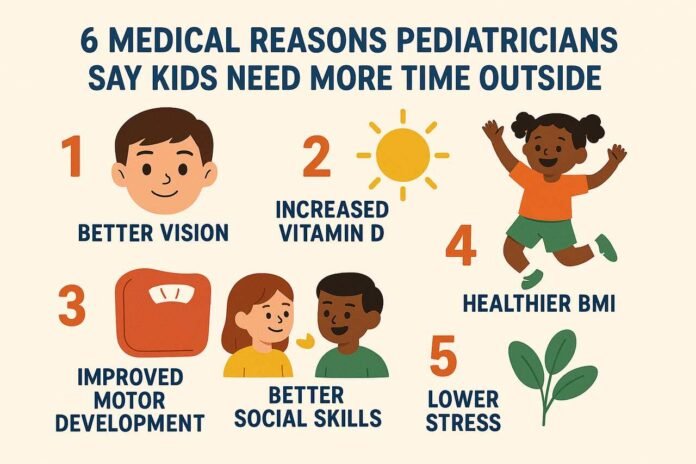Children today spend more time indoors and in front of screens than ever before, but pediatricians consistently emphasize that outdoor play is essential for healthy development. The fresh air, natural surroundings, and unstructured physical activity provide unique benefits that indoor activities simply cannot replicate. Here are six medical reasons pediatricians say kids need more time outside, along with insights from doctors and research from leading children’s health organizations.
1. Promotes Physical Health and Fitness
Regular outdoor play encourages children to move their bodies freely—running, jumping, climbing, and exploring spaces that stimulate physical fitness. Pediatricians warn that increasing sedentary screen time has contributed to higher rates of childhood obesity and associated health risks like type 2 diabetes and heart disease. Active outdoor play counters these trends by building muscle strength, cardiovascular health, and coordination. The natural movement patterns in play also improve children’s motor skills and help them meet developmental milestones naturally.
2. Enhances Mental Health and Emotional Well-Being
Being outside has proven mood-boosting effects. Pediatricians note that exposure to natural light and time in green spaces can reduce stress, anxiety, and symptoms of depression in children. Outdoor environments stimulate the brain differently from indoor settings, promoting relaxation and well-being. Kids who regularly play outside often experience better sleep quality, improved concentration, and reduced behavioral issues—all factors that support healthy emotional development.
3. Supports Social Skills and Peer Interaction
Outdoor playspaces foster unstructured, imaginative play, which is crucial for developing social competence. Pediatricians highlight that when kids play together outdoors, they practice cooperation, negotiation, conflict resolution, and empathy in ways that structured indoor activities may not allow. Playing in groups teaches children how to share, lead, follow, and build friendships, thereby strengthening their emotional intelligence.
4. Boosts Immune System Health
Time spent outdoors exposes children to a variety of microbes in natural environments, which helps build and strengthen their immune systems. Pediatricians explain that, contrary to over-sanitizing environments, which may increase allergies and autoimmune issues, balanced exposure helps the body develop natural defenses and tolerance. Regular outdoor play reduces illness rates and promotes long-term immune resilience.
5. Enhances Sensory Development and Cognitive Growth
The outdoor environment offers a rich sensory experience that supports brain development. Nature engages children’s senses of sight, sound, touch, and smell, while physical activity boosts neural connections involved in spatial awareness and coordination. Pediatricians emphasize that this multisensory input fosters creativity, problem-solving, and cognitive flexibility. Activities like exploring textures or playing with a pasta sensory bin outdoors further enhance tactile and exploratory learning.
6. Increases Vitamin D Absorption
Vitamin D is critical for bone health, immune function, and overall growth in children. Pediatricians stress that sunlight exposure through outdoor play is the natural and primary source of vitamin D. Vitamin D deficiencies are common among kids with limited outdoor time, especially in regions with long winters or urban settings. Playing outside regularly ensures kids get adequate sunlight to synthesize this essential nutrient, contributing to stronger bones and better overall health.
How to Encourage Outdoor Play Safely and Regularly
Pediatricians advise parents to prioritize outdoor time as part of daily routines. Simple strategies include scheduling regular park visits, backyard play sessions, or nature walks—even short periods count. Safety reminders, such as sun protection, hydration, and proper supervision, help ensure kids can enjoy the outdoors with reduced risk.
To support active play and organized equipment storage, families can turn to durable and spacious solutions such as Keter’s full line of plastic sheds. These sheds offer weather-resistant storage options for bikes, sports gear, and outdoor toys, keeping play areas clutter-free and accessible year-round.
The expert consensus among pediatricians is clear: outdoor play is a cornerstone of holistic child development, health, and happiness. From physical fitness and strong immunity to social skills and mental well-being, nature provides a unique, protective, and enriching environment that indoors cannot match. Given the challenges of modern life, including increased screen time and urban living, making a conscious effort to get kids outdoors can dramatically improve their health trajectories and quality of life.
Whether it’s a daily backyard romp or nature outings with friends, the benefits pediatricians champion are worth every moment spent outside. Parents who incorporate fun activities—like imaginative games or sensory experiences—are fostering thriving children who can meet the physical and emotional demands of childhood.










